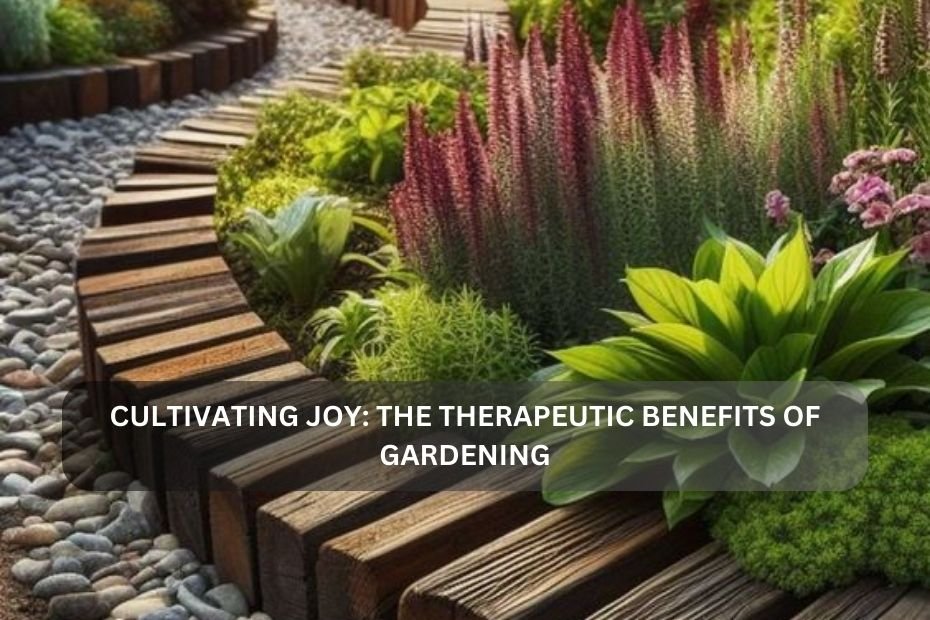In an increasingly fast-paced and technology-driven world, finding moments of peace and fulfillment can often feel elusive. However, one age-old practice that has stood the test of time is gardening. More than just a hobby, gardening offers profound therapeutic benefits that can enhance our physical, mental, and emotional well-being. This article explores how cultivating a garden can cultivate joy, improve mental health, and foster a deeper connection with nature.
The Connection Between Gardening and Well-Being
Gardening is a unique blend of physical activity, creative expression, and mindfulness. Engaging with nature has been shown to produce significant mental health benefits, ranging from reduced stress levels to improved mood. Research indicates that spending time outdoors can lower cortisol levels, the hormone associated with stress, while promoting relaxation and a sense of peace.
Physical Benefits
Gardening is often overlooked as a form of exercise, yet it involves various physical activities such as digging, planting, weeding, and watering. These activities can improve strength, flexibility, and endurance. A few hours of gardening can burn a substantial number of calories, making it an enjoyable way to stay active without the monotony of traditional workouts.
Moreover, exposure to sunlight while gardening helps the body produce vitamin D, essential for bone health and immune function. The combination of physical activity and fresh air can lead to improved overall health and increased energy levels.
Emotional Resilience Through Gardening
Gardening has a unique ability to foster emotional resilience. Engaging with plants and nature allows individuals to experience a sense of accomplishment and purpose. Nurturing a garden can instill feelings of responsibility and care, which can significantly boost self-esteem.
Mindfulness and Stress Relief
The act of gardening encourages mindfulness—an awareness of the present moment. Tending to plants requires focus and attention, allowing individuals to temporarily step away from their worries and distractions. This meditative quality can be incredibly beneficial for mental health.
Many gardeners report a sense of peace and tranquility while working in their gardens. The rhythmic tasks of planting, pruning, and watering can create a calming routine that helps reduce anxiety and fosters a greater sense of control over one’s environment.
Connection to Nature
In a world dominated by screens and artificial environments, gardening provides a much-needed connection to nature. This connection has been shown to improve mood and decrease feelings of loneliness. Spending time outdoors among plants and wildlife can evoke feelings of awe and wonder, which contribute to overall happiness.
Gardening also offers a sensory experience. The colors, textures, and scents of plants engage our senses, providing joy and stimulation. This sensory immersion can be particularly therapeutic for those dealing with stress or depression.
Social Benefits of Gardening
Gardening is often a communal activity, offering opportunities for social interaction. Community gardens, in particular, foster connections among neighbors and promote a sense of belonging. These spaces serve as gathering points where individuals can share knowledge, resources, and produce, creating a strong community bond.
Building Relationships
Participating in gardening groups or clubs can lead to new friendships and social networks. Sharing experiences, tips, and the joys of gardening with others can create a support system that enhances overall well-being. The act of working together toward a common goal—such as growing food or beautifying a shared space—strengthens social ties and fosters a sense of accomplishment.
Educational Opportunities
Gardening also offers opportunities for learning. Whether you’re growing your first tomato plant or experimenting with herbs, there’s always something new to discover. Many community gardens offer workshops and educational programs, allowing individuals to learn about sustainable practices, plant care, and the benefits of biodiversity. This sense of continuous learning can be empowering and enriching.
Therapeutic Gardening: A Structured Approach
For individuals with specific mental health challenges, therapeutic gardening programs are becoming increasingly popular. These programs are often guided by professionals, including horticultural therapists, who design activities to address specific needs.
Therapeutic Benefits
Research has shown that structured gardening activities can reduce symptoms of anxiety, depression, and PTSD. Engaging in gardening tasks can provide a sense of purpose, distract from negative thoughts, and promote positive feelings. These programs are particularly beneficial for veterans, individuals recovering from trauma, or those dealing with chronic illnesses.
Tailored Activities
Therapeutic gardening can include a variety of activities tailored to participants’ needs. For example, individuals may focus on growing flowers to enhance emotional well-being, cultivating vegetables for nutritional benefits, or engaging in sensory gardens that stimulate the senses.
Getting Started with Gardening
If you’re inspired to experience the therapeutic benefits of gardening, getting started doesn’t have to be overwhelming. Here are some tips for beginning your gardening journey:
Start Small
Begin with a small garden space or a few pots on a balcony. Choose plants that are easy to grow, such as herbs, flowers, or vegetables. Starting small allows you to build confidence and enjoy the process without feeling overwhelmed.
Choose the Right Plants
Select plants that align with your interests and environment. If you love cooking, consider growing herbs like basil or rosemary. If you’re drawn to vibrant colors, choose flowering plants that brighten your space.
Create a Routine
Establishing a regular gardening routine can enhance the therapeutic benefits. Set aside specific times each week to tend to your plants, allowing you to immerse yourself in the experience and create a sense of predictability and comfort.
Connect with Others
Consider joining a local gardening club or participating in community gardening initiatives. Engaging with fellow gardeners can enhance your experience, provide support, and foster a sense of community.
Embrace Imperfection
Gardening is a learning process. Embrace mistakes and unexpected outcomes as part of the journey. Each season offers new lessons, and cultivating patience with yourself can be a rewarding aspect of the experience.
Conclusion: The Joy of Cultivating a Garden
Gardening is a powerful tool for cultivating joy and well-being. Its therapeutic benefits extend beyond mere plant care; they encompass emotional, physical, and social dimensions that enrich our lives. Whether you’re digging in the soil, tending to blossoms, or harvesting fresh produce, gardening offers a unique path to fulfillment and happiness.
As you embark on your gardening journey, remember that the act of nurturing plants can also nurture your spirit. In a world that often prioritizes speed and productivity, gardening invites us to slow down, reconnect with nature, and find joy in the simple act of growth. Cultivate your garden, and in turn, cultivate joy.

